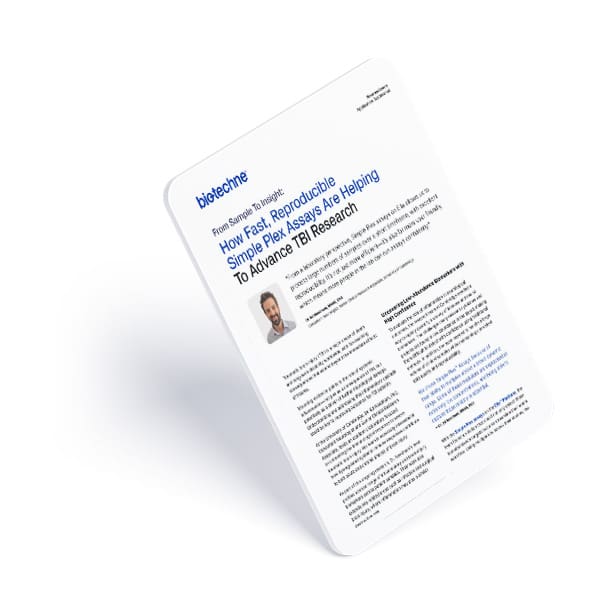How Fast, Reproducible Simple Plex Assays Are Helping To Advance TBI Research
"From a laboratory perspective, Simple Plex assays on Ella allow us to process large numbers of samples over a short timeframe, with excellent reproducibility. The platform is not just more efficient—it’s also far more user friendly, which means more people in the lab can run assays confidently."
- Dr. Ed Needham, Senior Clinical Research Associate, University of Cambridge
Traumatic brain injury (TBI) is a major cause of death and long-term disability worldwide, with far-reaching consequences that extend beyond the immediate effects of trauma. Mounting evidence points to the role of systemic inflammation—not just as a consequence of TBI, but potentially as a driver of further neurological damage. Understanding and addressing this inflammatory cascade could be key to improving outcomes for TBI patients.
At the University of Cambridge, Dr. Ed Needham, PhD, Consultant Neurologist and Senior Clinical Research Associate, leads an academic laboratory focused on unraveling the immunological response to severe traumatic brain injury. His team is especially interested in how dysregulated systemic immune responses contribute to both acute and chronic phases of brain injury.
As part of this ongoing research, Dr. Needham’s team profiles a broad range of inflammatory and brain-injury biomarkers across patient samples. Their work also extends into related areas such as infection and surgical brain injury, where inflammation may play a similar destructive role.

Uncovering Low-Abundance Biomarkers with High Confidence
To evaluate the role of inflammation in neurological outcomes, the research team at Cambridge needed a way to rapidly quantify a variety of immune and neural biomarkers. The challenge: many relevant cytokines and proteins are found in low abundance in the blood, making them difficult to detect with confidence using traditional methods. In addition, the team needed to handle a large volume of clinical samples while maintaining consistent data quality and reproducibility.
We chose Simple Plex™ Assays because of their ability to multiplex across a broad dynamic range,” said Dr. Needham. “Some of these mediators are expressed at extremely low concentrations and being able to capture those reliably is essential.”
With the Simple Plex assays on the Ella™ Platform , the team found a solution that could not only detect those low-abundance targets but also streamline their entire workflow. Using multiple kits across their studies, the team has primarily focused on cytokine profiling as well as key brain-injury markers such as neurofilament light (Nf-L) and glial fibrillary acidic protein (GFAP).
Boosting Throughput Without Compromising Data Quality
Simple Plex has had a measurable impact on the team’s throughput and research capacity. Compared to previous platforms, the Ella platform’s ease of use and fast turnaround time have proven to be major advantages.
“From a laboratory perspective, Simple Plex allows us to process large numbers of samples over a short timeframe, with excellent reproducibility,” Dr. Needham said. “It’s not just more efficient—it’s also far more user friendly, which means more people in the lab can run assays confidently.”
That user-friendliness has translated to greater flexibility in how the team structures its studies and allocates resources. Instead of bottlenecking on assay setup and sample processing, researchers can focus more on data interpretation and the next steps in discovery.
Exploring Traumatic brain injury (TBI) Impact
The team’s work has already revealed key insights. One of the most important: dysregulated inflammation is strongly associated with worse clinical outcomes in TBI. The next step is determining causality—whether modifying that inflammatory response can actually improve neurological recovery.
“We are finalizing data analysis and beginning the manuscript write-up now,” Dr. Needham said. “But we’re also moving into interventional studies that will explore how modifying inflammation might change the course of injury.”
One potential application involves using Ella to stratify patients for clinical trials based on their inflammatory profile. With the platform’s rapid processing capabilities, Dr. Needham envisions a future in which patients could be identified in real time as candidates for anti-inflammatory treatment trials—potentially enriching trial populations and improving therapeutic success rates.
A Scalable Solution for High-Impact TBI Research
For Dr. Needham and his team, the value of Simple Plex lies not just in performance metrics, but in its ability to accelerate the research process as a whole—from sample to insight.
“It’s incredibly user friendly, reliable, and time-efficient,” Dr. Needham said. “It’s also cost-effective. At this point, it’s our go-to platform.”
With the ability to produce high-quality, reproducible data at scale, Simple Plex has enabled new research directions—and may soon help guide therapeutic strategies that improve patient outcomes in traumatic brain injury and beyond.